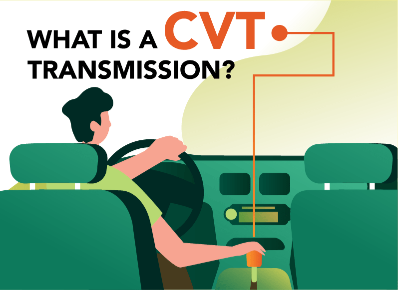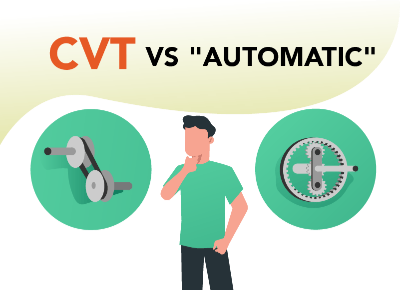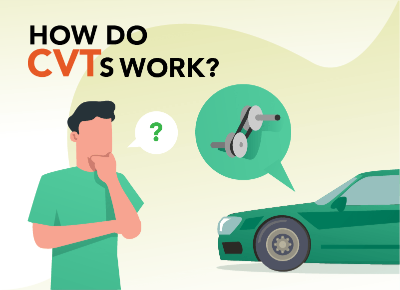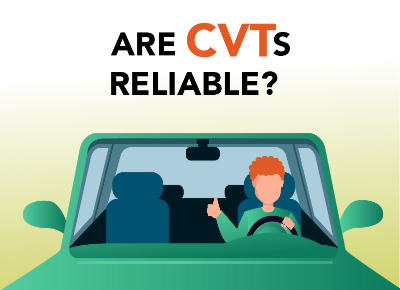What Is a CVT Transmission (& Should You Avoid Them)?
February 8, 2023
John Goreham is a life-long car nut and recovering engineer. John’s focus areas are technology, safety, and green vehicles. In the 1990s, he was part of an academic team that built a solar-electric vehicle from scratch. His was the role of the battery thermal control designer. After earning his engineering degree, John also completed a marketing program at Northeastern University. For 20 years, he applied his engineering and sales talents in the worlds of semiconductor manufacturing, biopharmaceutical production, and automotive electronics supply chain. Always a writer, John has published numerous articles in technical journals such as Chemical Processing Magazine. In 2008 he retired from that career and dedicated himself to chasing his dream of being an auto writer. In addition to online publications such as Car Talk, John’s work has appeared in print in dozens of American newspapers, and he provides reviews to many vehicle shopping sites.

If you're shopping for a new commuter car or crossover, you may have found that the model you favor comes with a continuously variable transmission (CVT).
You may also have heard some bad rumors about CVTs and been warned off of them by your cousin’s brother’s friend.
We have compared CVTs to traditional transmissions and come to a firm conclusion on whether they are a good choice.
Table of Contents
- CVT Transmission Explained Video
- What Is a CVT Transmission?
- CVT Transmission Pros
- CVT Transmission Cons
- CVT Transmission Problems
- CVT vs "Automatic" Transmission
- How Do CVTs Work?
- How Long Do CVT Transmissions Last On Popular Car Brands?
- Are CVTs Reliable?
- Who Does It Best?
- CVT Conclusions
- Best Car Deals by Category
- Frequently Asked Questions
CVT Transmission Explained Video
What Is a CVT Transmission?
A CVT, or Continuously Variable Transmission, is a type of automatic transmission that constantly and seamlessly shifts through an unlimited number of gear ratios to make the engine run more efficiently. They are also known as, "single-speed" or "shiftless" transmissions.
Traditional, mechanical transmissions have a fixed number of gear ratios, such as 6,8, or 10, and have a noticeable shift-feel when switching between gear ratios.
Since a CVT does not rely on a fixed number of gear ratios, the transmission is constantly adjusting based on how much power is needed, which results in a very smooth and fuel-efficient driving experience.
CVT Transmission Pros
- Fuel Economy. Outstanding fuel economy
- Driving. Smooth driving sensation
- Familiar. No difference in usage than old-school automatics (familiar controls)
- Reliable. Some brands have outstanding reliability history
CVT Transmission Cons
- Different Feeling. No-shift feeling takes getting used to
- Some Have Poor Reliability. Some used vehicle models and years do have examples of poor reliability
CVT Transmission Problems
Like many new technologies, some early CVTs had legitimate reliability issues. Nissan, Subaru, and other brands responded with technical service bulletins, extended warranties, and in some cases, recalls. Let’s keep in mind that other types of automatic transmission during that same period also had TSBs, extended warranties, and recalls.
Aside from some legitimate failures, CVTs gained a bad reputation early on because they offer a different sensation than traditional fixed gear ratio transmissions. They are smoother and don’t provide the “shifting” feeling we had all become accustomed to. New is scary, and sometimes it makes a driver react negatively. Others feel the opposite way. Drive a CVT for a while, then hop in a car with a traditional transmission, and you may say, “Why does this car keep on shifting?” It doesn’t take long to appreciate the smoother drive of a CVT if you are open to it.
CVT vs "Automatic" Transmission
 A CVT offers most of the same ease of use that traditional automatics do. One selects Dive or Reverse, and the CVT then handles the engine’s speed range settings.
A CVT offers most of the same ease of use that traditional automatics do. One selects Dive or Reverse, and the CVT then handles the engine’s speed range settings.
Technically, a CVT is an automatic transmission. Like all automatics, you have a gear selector, and the usual P, R, N, D, L are offered. Paddle shifters may also be included. CVT designs vary. Some have torque converters like traditional fixed-ratio automatics. Others use other techniques to achieve the same ends. In daily use, a CVT acts like any other automatic transmission with regard to how your drive mode is selected. Where a CVT differs from a traditional automatic transmission is the number of fixed speed ratios it can achieve. Unlike a traditional geared transmission, a CVT can vary the engine speed across a very wide range.
How Do CVTs Work?
 CVTs use a variety of designs, but they share a common theme. Instead of a set number of individual gears, CVTs employ methods to vary the engine speed across the engine’s operating range. In other words, the fixed gear ratios are replaced with a constantly varying speed setting.
CVTs use a variety of designs, but they share a common theme. Instead of a set number of individual gears, CVTs employ methods to vary the engine speed across the engine’s operating range. In other words, the fixed gear ratios are replaced with a constantly varying speed setting.
Some CVTs use a belt or chain-driven system. Others, like the Toyota CVTs, are “electronic” and use no belts and no chains. For example, the CVT in a Prius, or a RAV4 Hybrid, uses a pair of motors in concert with a gear system.
Some CVT designs even add a “shift” feeling if you accelerate aggressively. The idea being that drivers may wish to feel the old-school shifting sensation.
How Long Do CVT Transmissions Last On Popular Car Brands?
CVT transmissions last just as long as a traditional automatic transmissions and are designed to last the full life of the vehicle. The typical CVT has a life expectancy of at least 100,000 miles. Certain models like the Toyota Prius commonly last well over 300,000 miles. Like all vehicle components, some brands have a better life expectancy than others when properly maintained.
Toyota CVT Transmission Life Expectancy
Overall, Toyota CVT transmissions are very reliable. On average, a Toyota CVT transmission lasts around 120,000 miles. Even so, many original Toyota transmissions last more than 160,000 miles.
Honda CVT Transmission Life Expectancy
With proper care and maintenance, a Honda CVT can last anywhere from 100,000 to 200,000 miles or more. However, the life expectancy of a Honda continuously variable transmission (CVT) varies depending on various factors, including maintenance, driving conditions, and driving habits
Nissan CVT Transmission Life Expectancy
A Nissan CVT Transmission is expected to last around 120,000 miles, which is also the length of the Extended CVT Warranty form the Manufacturer. However, some Nissan CVTs may last for less, or for more, miles. Nissan faced many law claims for CVT transmission defects, and if yours is a lemon they may refund your purchase.
Suburu CVT Transmission Life Expectancy
Subaru CVT transmissions may last a long time, even longer than 100,000 miles. However, this is only if you stick to the recommended maintenance. However, Subaru has faced many complaints about CVT problems within the first 10 years of ownership.
Are CVTs Reliable?
 Yes, CVTs have good reliability overall. CVTs from some brands have proven to last the vehicle's life with reduced maintenance needs as an added benefit.
Yes, CVTs have good reliability overall. CVTs from some brands have proven to last the vehicle's life with reduced maintenance needs as an added benefit.
Are there some older models that have had trouble? Of course. A good way to determine if a model has a track record of good reliability is to use a resource like Consumer Reports or Car Complaints. These sites compile owner-reported data to give shoppers of new and used cars a gauge of a vehicle’s reliability. Both also break down trouble spots in great detail.
For example, the Toyota Prius, which comes only with a CVT, has a perfect record of 5/5 reliability at Consumer reports from 2009-2020. By contrast, the 2014 and 2016 Nissan Altima, which uses a different CVT design, has the lowest rating of ⅕, and the transmission is singled out as part of the reason for the low rating at Consumer Reports.
Who Does It Best?
Several manufacturers offer CVT transmissions, so who does it best? Here are some of the top manufacturers to compare.
Toyota CVT Transmission
Toyota touts its CVT transmission as the best choice for performance and fuel efficiency. Toyota has a Direct Shift CVT, which combines the most efficient parts of the conventional transmission and CVT transmission.
The Direct Shift-CVT utilizes the first gear of a conventional transmission, which helps the vehicle accelerate more quickly. After the vehicle reaches the speed where CVT transmission is better, the transmission changes to function like a CVT. The top benefits of the Direct Shift-CVT include:
- Incredible shift speed
- 6% fuel efficiency improvement
- Improved belt efficiency
- 15% increase in ratio spread
- Narrow belt angle
Toyota models with the conventional CVT (not Direct Shift) include:
- Toyota RAV4
- Toyota Prius
- Toyota Corolla
- Toyota C-HR
- Toyota Camry
Typically, Toyota is touted for reliability. While this is largely the case, they have had recalls. One of the biggest recalls was for the 2019 Toyota Corolla Hatchback due to breakage-prone torque converters of the CVT.
But while Toyota is generally well-regarded for reliability, it's important to acknowledge that no manufacturer is immune to occasional recalls. In the case of the 2019 Toyota Corolla Hatchback, there was a recall due to breakage-prone torque converters of the CVT.
It's worth noting that recalls are measures taken by manufacturers to address potential issues promptly and ensure customer safety. Toyota's commitment to addressing concerns through recalls demonstrates their dedication to maintaining the reliability and quality of their vehicles.
Honda CVT Transmission
Honda Control is a unique feature of Honda CVT. The car automatically detects “sporty” driving (i.e. down a winding road) and will maintain a higher engine speed. By maintaining a higher engine speed, the vehicle improves the smoothness of the ride amidst deceleration and acceleration.
The top benefits of the Honda CVT include:
- Improved fuel economy
- Smoother gear changes for a smoother ride
- Honda Control
Honda has many vehicles with CVT, including:
- Honda Civic
- Honda Accord
- Honda Fit
- Honda Insight
Honda had a major recall on CVT transmissions. One recall was on the 2014 and 2015 Honda Civic for an issue with transmission software. The software caused pressure on the CVT pulley, which resulted in drive shaft pulley breakage. Additionally, there is a lawsuit against Honda for 2016-2018 Honda Civic CVT transmission problems where the vehicle states it was in park when it was not.
Nissan CVT Transmission
Nissan was the first to introduce CVTs up to 3.5 liters. They offer many CVT models, including compact and luxury vehicles.
The top benefits of Nissan CVT include:
- Smooth ratio changes (CVT shifts ratios 30% faster) for seamless acceleration
- Quicker response and efficiency
- Fuel economy
Some of the Nissan models with CVT include:
- Nissan Altima
- Nissan Murano
- Nissan Pathfinder
- Nissan Rogue
- Nissan Sentra
However, Nissan has made headlines for recent CVT issues. The most common problems with Nissan CVT transmissions are:
- Problems with the Murano (2003), Altima (4th and 5th generation), Pathfinder (3rd and 4th generation), Rogue (1st and 2nd generation), Sentra (6th generation), and Versa (1st and 2nd generation)
- Shaking or stuttering during acceleration
- Hot transmissions
- Transmission shutdowns without warning
- Problems accelerating
Given the host of serious problems with several Nissan CVT models, Nissan CVTs are not reliable. Nissan has taken responsibility and offered extended warranties. While they are looking to resolve the issues and improve their CVTs, they have a reputation for low reliability.
Subaru CVT Transmission
Subaru offers CVT for several models. Subaru combines its Boxer engine with the CVT. They offer a unique manual mode via steering-wheel-mounted paddle shifters.
The benefits of Subaru CVT include:
- Reduced fuel consumption
- Smooth operation
- Automatic Mode instantly adjusts for your acceleration
- Lighter vehicle
- Smoother acceleration
- Offers manual mode
Subaru models with the CVT include:
- Subaru Outback
- Subaru Legacy
- Subaru Forester
- Subaru Impreza
- Subaru Crosstrek
- Subaru WRX
Overall, Subura is recognized as a reliable manufacturer. However, they have had issues with the CVT transmission. The Subaru CVTs received incredibly low ratings for reliability for several models for around five years (2012 to 2017). Subaru extended their warranty to address CVT transmission problems. The most common issues with Subaru CVT vehicles were:
- Stalling
- Shaking, shuddering
- Leaking fluid
CVT Conclusions
Many manufacturers such as Subaru, Honda, Nissan, and Toyota use continuously variable transmissions on their most popular models. If you are shopping for a new Prius, Civic, Accord, Corolla, Forester, or Outback, don’t let a CVT automatic concern you. CVTs have proven enjoyable and reliable for many vehicle owners. If you are shopping used, do your homework and look for the reliability history of that specific make, model, and year using sources like Consumer Reports. Avoid years with any poor records of reliability.
CVTs offer smooth driving, familiar controls, and great fuel efficiency gains. If you have not tried one yet, we suggest giving the new feeling a bit of time. Do so, and the chances are you will learn to love the feeling and enjoy many years of satisfied driving.
Best Car Deals by Category
Frequently Asked Questions
Is CVT better than automatic transmission?
A continuously variable transmission is a type of automatic transmission. Unlike a traditional automatic with a small number of fixed gear ratios, a CVT can vary the engine speed infinitely within the engine’s operating range.
Are CVT transmissions good and why?
CVT transmissions offer many helpful benefits, which is why they’ve become so popular. Since a CVT transmission adjusts based on the necessary power, it offers a smoother driving experience. This technology is also more fuel-efficient, providing excellent fuel economy. Many brands that use CVT transmissions, like Honda and Toyota, have great reputations for reliability.
How long do CVT transmissions last?
CVTs are designed to last the full lifespan of the vehicle. One of the longest-running models using a CVT is the Toyota Prius. Many owners find they last well beyond 300,000 miles.
Is CVT transmission automatic?
Yes, a CVT is an automatic transmission. A driver chooses P R N D L from the drive selector, and the CVT controls the engine speed.
Why is CVT not liked?
There are many reasons some drivers don’t like a CVT. Some drivers prefer a manual transmission and a CVT is an automatic. Others miss the old-school shifting sensations and don’t prefer the smoother feeling a CVT offers.
What are the advantages of CVT?
Some of the advantages of CVT include outstanding fuel economy, a smooth driving sensation, and solid reliability history.
What are the disadvantages of CVT?
Some of the disadvantages of CVT include no familiar shift feeling and some models are known to have poor reliability.
Posted in Car Buying Tips |




